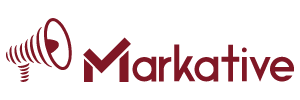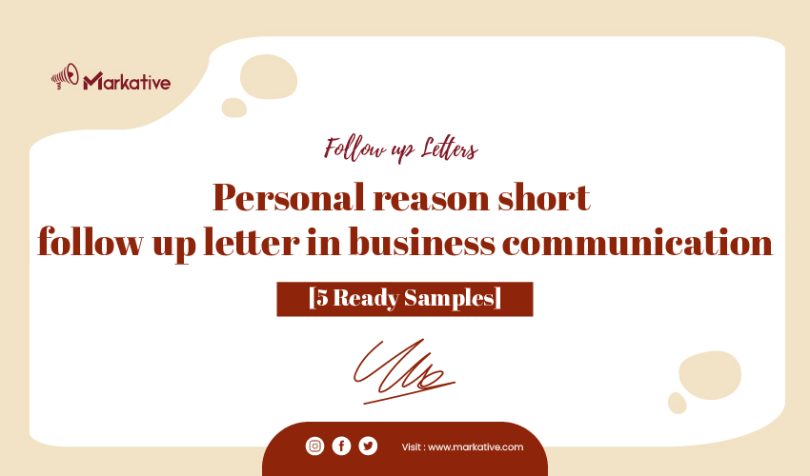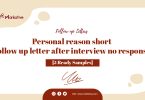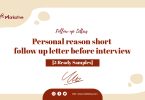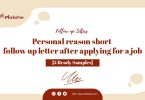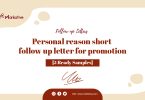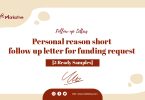If you’ve ever applied for a job, reached out to a potential client, or followed up with a colleague, you know how important it is to communicate professionally. That’s why writing a follow-up letter is necessary for businesses. A well-written follow-up letter is a powerful tool that can help businesses develop a better relationship with customers, clients, and employees.
In this article, we will provide you with a comprehensive guide and 9 ready samples on how to write a follow-up letter in business communication. We will cover everything you need to know, including the purpose of a follow-up letter, what information to include, how to structure it, and key tips on how to make it more effective.
The Purpose of a Follow-Up Letter in Business Communication
The purpose of a follow-up letter is to strengthen the relationship between the sender and the receiver. It’s an opportunity to:
- Express gratitude for the recipient’s time, effort, or information
- Reinforce a message or call-to-action from a previous communication
- Remind or prompt action from the recipient
- Build rapport and trust
Keep in mind that the purpose of your follow-up letter may vary depending on the situation or your objective. For example, a follow-up letter for a job application may aim to express your continued interest in the position and showcase why you are the best fit for the job.
How to Structure a Follow-Up Letter in Business Communication
A follow-up letter should be formatted and written professionally, like any other business communication. Here are the key elements and their recommended structure:
- Header: Include the date and your contact information (name, address, phone number, email, and job title) as well as the recipient’s details (name, job title, company). If you know the recipient’s preferred greeting, you can include it here as well.
- Salutation: Greet the recipient respectfully with “Dear [Name],” unless you have established a more informal relationship or request. You can also use “Hello [Name],” “Hi [Name],” or “Greetings [Name],”
- Opening Paragraph: In the opening paragraph, you want to express gratitude and remind the recipient of your previous communication. You may also state the reason for your follow-up letter or clarify any misunderstanding.
- Body Paragraph: The middle part of your follow-up letter should be focused on the main message. Reiterate your question, request, proposal, or anything that needs attention from the recipient. Be specific and concise. Provide context, background information, and add value if possible. Also, address or anticipate any objections, if relevant.
- Closing Paragraph: In your last paragraph, you should recapitulate the main points, express appreciation again and suggest a concrete next step. For instance, you can request a call or meeting, invite them to contact you with any questions, or leave your contact information in case they need further assistance. A polite farewell phrase like “thank you for your time” or “best regards” is the most appropriate.
- Signature: Include a closing to show your professionalism, like “Sincerely,” “Yours faithfully,” or “Respectfully” and sign your full name. If you are sending the letter via email, a typed name and contact details suffice.
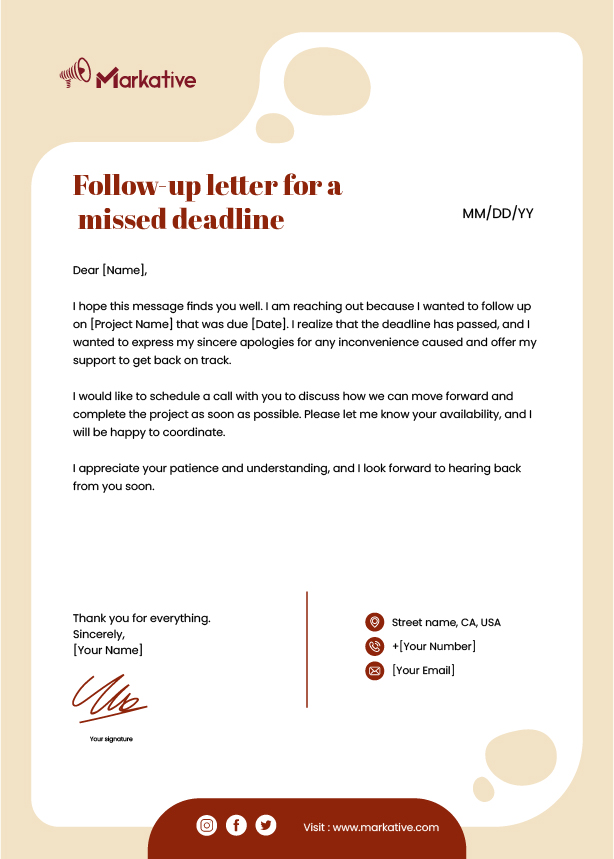
Tips for Writing a Follow-Up Letter in Business Communication
Writing a follow-up letter may appear straightforward, but small modifications can make a significant difference. Below are some useful tips to ensure your letter has maximum impact:
- Be prompt and relevant: Sending your letter promptly is essential to ensure the recipient understands the context, and your request is still relevant. For example, a follow-up letter for a job application should be sent within two weeks of the interview. Similarly, be relevant by demonstrating your value or interest in the recipient’s perspective.
- Be positive and professional: Your follow-up letter should maintain a positive tone and attitude. It conveys a sense of gratitude, enthusiasm, and respect. Incorporate appropriate and professional language and avoid any slang, jargon, or informal words that could detract from your message.
- Be Specific and concise: To hold the recipient’s attention, you should focus on the critical points and summarize them concisely. Avoid giving too much detail that can be overwhelming or vague. Instead, provide the specific information that you want the recipient to know.
- Be attentive to format and grammar: Follow basic formatting guidelines to ensure that your letter is well-structured, easy to read, and visually compelling. Proofread your letter thoroughly to ensure that there are no grammar or spelling mistakes. Typos convey lack of attention to detail which could ruin the whole purpose of your letter.
- Be respectful of the recipient’s privacy: Ensure that your letter respects the recipient’s privacy by not sharing any gratuitous personal information that is not relevant to the context of your follow-up letter. Avoid asking questions that may seem intrusive or overstepping the boundaries of professionalism.
For More: Best Business Follow-Up Letter Sample 7 Ready Templates
9 Ready Samples of Follow-Up Letter in Business Communication
To help you get started, here are nine different sample follow-up letters that you can adapt to your specific needs. You can use them as a reference or customize them according to your situation.
Follow-up letter for a job application
Dear [Name], Thank you for considering my application for the [Job Title] position at [Company Name]. I enjoyed speaking with you during the interview and learning more about your organization. I am following up to express my continued interest in the position and to inquire about the status of my application. I would appreciate any updates you can provide me regarding the hiring process or next steps. I believe that my experience and skills in [Field] would make a valuable contribution to your team. If you need any further information from me, please don't hesitate to ask. Thank you for your time and consideration. Sincerely, [Your Name]
Follow-up letter for a missed deadline
Dear [Name], I hope this message finds you well. I am reaching out because I wanted to follow up on [Project Name] that was due [Date]. I realize that the deadline has passed, and I wanted to express my sincere apologies for any inconvenience caused and offer my support to get back on track. I would like to schedule a call with you to discuss how we can move forward and complete the project as soon as possible. Please let me know your availability, and I will be happy to coordinate. I appreciate your patience and understanding, and I look forward to hearing back from you soon. Best regards, [Your Name]
Best Follow-up letter for a proposal
Dear [Name], I wanted to follow up on the [Project Name] proposal that I sent you on [Date.] I hope you found it informative and valuable. I would like to discuss any questions or concerns you may have regarding the proposal or arrange a presentation to go through it in detail. I believe that our solution meets your needs and can help you achieve [goals]. We have experience working on similar projects, and we can deliver within [time frame] and [budget]. Please let me know if you would like to proceed with our proposal or have any feedback or questions. I would love to discuss further and explore the possibility of working together. Thank you for your consideration, and I look forward to hearing back from you soon. Best regards, [Your Name]
For More: Best Business Contract Termination Letter [7+ Templates]
Follow-up letter for networking
Dear [Name], I hope this message finds you well. I wanted to follow up on our recent meeting at [Event Name] and express my gratitude for your time and insights. I enjoyed our conversation, and I believe that we share similar interests and goals. I wanted to suggest a follow-up call or meeting where we can discuss further and explore ways to collaborate. I am impressed with your recent work on [Topic], and I believe that we can learn from each other and create value for our respective organizations. Please let me know your thoughts and availability, and I will be happy to coordinate. Thank you again for your time, and I look forward to reconnecting soon. Best regards, [Your Name]
Follow-up letter for a sales pitch
Dear [Name], Thank you for your interest in our [Product/Service] and for taking the time to meet with us [Date/Time]. I hope that you found our presentation informative and that we can offer a solution that meets your needs and expectations. I wanted to follow up on our meeting and answer any additional questions you may have. Our [Product/Service] can help you [solve problem/reach objective], and we have experience working with [industry/niche]. We are committed to delivering high-quality results and providing exceptional customer service. Please don't hesitate to contact me if you have any further questions, or if you are ready to move forward with our proposal. Thank you for your consideration, and I look forward to hearing back from you soon. Best regards, [Your Name]
Best Follow-up letter for a referral
Dear [Name], I hope you are doing well. I wanted to follow up on the referral you kindly provided me with for [Business/Opportunity]. I reached out to [Person/Company], and they expressed an interest in connecting with me. I wanted to express my gratitude for your assistance and to share my progress with you. I believe that this opportunity aligns well with my goals and experience, and I look forward to exploring it further. Please let me know if you have any additional suggestions or recommendations. Your support and guidance are greatly appreciated. Thank you again for your help, and I hope to see you soon. Best regards, [Your Name]
Follow-up letter for a networking event
Dear [Name], I want to thank you for attending the [Name of Event] networking event last week and for taking the time to speak to me about your company [Company Name] and your experience in the industry. I enjoyed learning more about your experience and expertise in [Field] and believe that my skills and experience could benefit your organization. I would love to continue our conversation over coffee or lunch and discuss how we can potentially work together or refer business to each other. If you're available, I would love to schedule a meeting with you at your convenience. Please let me know if this is something that interests you. Thank you again for your time and insights. Best regards, [Your Name]
Follow-up letter for a customer inquiry
Dear [Name], I wanted to follow up with you regarding your recent inquiry into [Product/Service]. I appreciate your interest and wanted to take the time to answer any additional questions or concerns you may have. Our [Product/Service] is designed to [benefits of the product/service]. We're proud of the quality of our [Product/Service] and the satisfaction of our customers. If you need any further assistance, please do not hesitate to contact me. I would be more than happy to help you in any way possible. Thank you again for considering our company. Best regards, [Your Name]
Best Follow-up letter for a missed call
Dear [Name], I hope this message finds you well. I apologize for missing your call earlier today, and I wanted to follow up. Please let me know when it would be convenient to speak with you. I look forward to connecting with you soon and discussing how we can [purpose of call - i.e., collaborate, move forward, address any unresolved issues]. Thank you for your patience and understanding, and I look forward to hearing back from you. Sincerely, [Your Name]
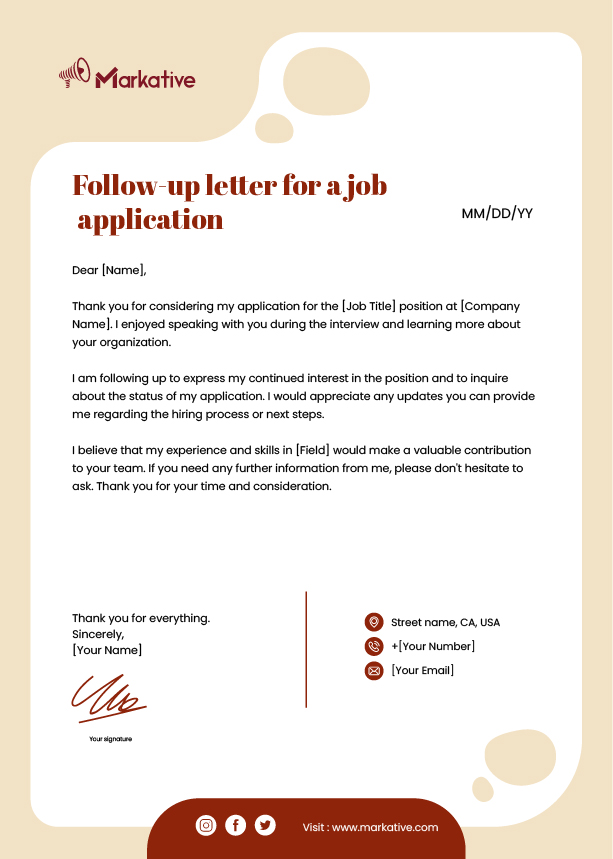
Key Takeaway
Writing an effective follow-up letter can make a significant impact on your business communications. By incorporating the essential elements, following the recommended structure, and adopting the tips provided, you can deliver a clear and concise message that strengthens your relationship with the recipient.
Remember to be prompt, positive, and professional, and avoid any language or behavior that could be interpreted as disrespectful or unprofessional.
Use the nine-sample follow-up letters provided as a reference and customize them to best fit your particular goal. With the tips and examples, you should now be well-equipped to craft a strong follow-up letter that leaves a positive impression and lingers in the recipient’s memory. Good luck!
